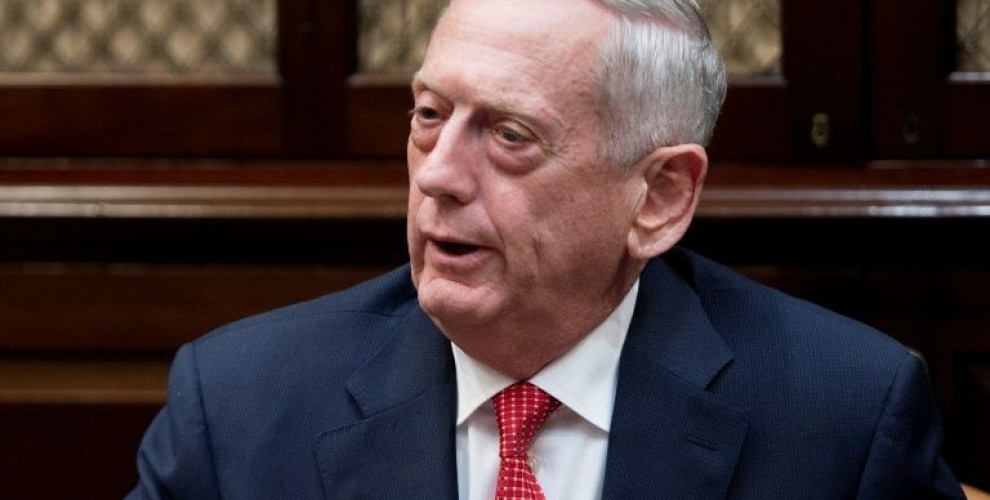Mattis warns Syrian offensive against Kurds would be a mistake
US Secretary of Defense Jim Mattis warned President Bashar al-Assad against launching an offensive against US-supported Syrian Kurds, after the Syrian leader slammed them as "traitors".
US Secretary of Defense Jim Mattis warned President Bashar al-Assad against launching an offensive against US-supported Syrian Kurds, after the Syrian leader slammed them as "traitors".

US Secretary of Defense Jim Mattis warned President Bashar al-Assad against launching an offensive against US-supported Syrian Kurds, after the Syrian leader slammed them as "traitors".
"That would be a mistake," Mattis told reporters at the Pentagon on Friday, according to AFP.
There is currently a demarcation line between areas controlled by the US-led coalition battling jihadists with the Islamic State group, mainly in eastern Syria, and those controlled by Syria and its Russian allies in western Syria.
"We have said that we would operate on one side and the Russians on the other," Mattis said. "And we are still taking (the ISIS) down. Nothing has changed."
"It's a mistake" to cross that line, he emphasized.
"When we talk about those referred to as 'the Kurds', they are in fact not just Kurds," Assad said in remarks released by the Syrian presidency in mid-December.
"All those who work for a foreign country, mainly those under American command are traitors”, he said.
In early December a Pentagon spokesman said that US forces would remain in Syria "as long as necessary.” On Friday Mattis added that US diplomats will soon be on the ground in eastern Syria to organize de-mining and reconstruction projects.
"The military would move our diplomats around, make certain to protect them," Mattis said.
"What we will be doing is shifting from what I would call ... an offensive terrain seizing approach to a stabilizing" operation, he said.
The destruction of the Islamic State of Iraq and Syria’s physical caliphate will change the way the coalition will go after the terror group, Defense Secretary James N. Mattis told Pentagon reporters.
“We are in the process of crushing the life out of the caliphate there while trying to keep the innocent people safe -- which is very hard with this group,” he said.
ISIS operatives who move into the region controlled by the regime of Syrian President Bashar Assad and the Russians are another matter. The SDF and the coalition will not launch attacks past the demarcation line, Mattis said. Having the terrorists in their area is not in Assad’s or the Russian’s best interests. The United States tipping off Russia of a potential ISIS attack in St. Petersburg is an example of ways the countries can work together against the group.
Mattis stresses that the battle against ISIS is not over. While the group has been shattered, its survivors are looking for ways and places to reconstitute, he added.
“It’s only a safe haven if people give them one,” Mattis said.
In Iraq, the coalition will continue to work with the Iraqi government to train troops and police and develop the intelligence needed to find and take down terrorists trying to launch attacks.
“We need to drive this down to the point where it can be handled by local authorities -- police,” he said. “But right now, it is still very much a military intelligence type of operation as the police try to set up local operations. Eventually, it will be rule of law and local security forces.”
Hunting ISIS down is not over. “Am I worried about it? Not in the least,” Mattis said. “These guys have not proven they can stand against the Iraqi security forces [or] the SDF. They are best against unarmed men, women and children.”
Looking to 2018, Mattis sees ISIS as being a “brand” for terrorists. “It can inspire lone wolf attacks; it can inspire other groups,” he said. “But it is less inspirational when they have lost their physical caliphate; it is less inspirational as the stories of what it was like living under their rule come out. I think it is a brand with a diminishing appeal, but the appeal is still there for those who go in for that philosophy.”
In both Iraq and Syria, U.S. troops will be shifting from an offensive terrain-seizing approach to a stabilizing effort focused on supporting the diplomatic approach, the secretary said. This will include clearing areas of improvised explosive devices, helping civil authorities set up water and electrical systems and helping reopen schools and working with police.